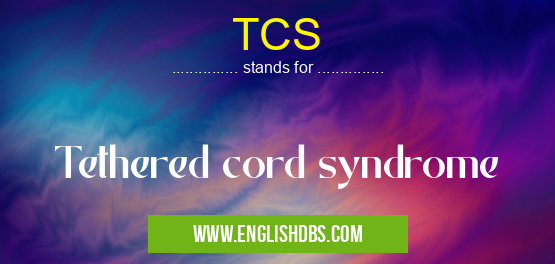What does TCS mean in MEDICAL PHYSICS
TCS (Tethered cord syndrome) is a neurological condition that occurs when the spinal cord is abnormally attached to the surrounding tissues. This attachment can restrict the movement of the spinal cord and cause a variety of symptoms.

TCS meaning in Medical Physics in Medical
TCS mostly used in an acronym Medical Physics in Category Medical that means Tethered cord syndrome
Shorthand: TCS,
Full Form: Tethered cord syndrome
For more information of "Tethered cord syndrome", see the section below.
Symptoms
- Weakness or numbness in the legs or feet
- Difficulty walking or running
- Pain in the back or legs
- Scoliosis (curvature of the spine)
- Urinary or bowel incontinence
- Sexual dysfunction
Causes
TCS can be caused by a variety of factors, including:
- Spina bifida: A birth defect that occurs when the spinal cord does not close properly during pregnancy
- Trauma: An injury to the spine
- Tumors: A growth in the spinal canal
Diagnosis
TCS is diagnosed based on a physical examination and a review of the patient's symptoms. Imaging tests, such as an MRI, may be used to confirm the diagnosis.
Treatment
The treatment for TCS depends on the severity of the condition. In some cases, surgery may be necessary to release the tethered spinal cord. Other treatments may include:
- Physical therapy
- Occupational therapy
- Medications to relieve pain or muscle spasms
Essential Questions and Answers on Tethered cord syndrome in "MEDICAL»MEDPHY"
What is Tethered Cord Syndrome (TCS)?
TCS is a congenital disorder characterized by an abnormally low connection between the spinal cord and the lower end of the spinal canal during fetal development. This tethering prevents the normal movement of the spinal cord, leading to potential neurological problems.
What causes Tethered Cord Syndrome?
TCS is typically caused by a defect in the development of the spinal cord during pregnancy. This defect can be due to genetic factors, exposure to certain drugs or toxins during pregnancy, or a spinal injury in early childhood.
What are the symptoms of Tethered Cord Syndrome?
Symptoms of TCS can vary depending on the severity of the condition. They may include:
- Pain, weakness, or numbness in the legs or feet
- Difficulty walking or maintaining balance
- Incontinence of the bowels or bladder
- Scoliosis or other spinal deformities
- Foot deformities, such as clubfoot
How is Tethered Cord Syndrome diagnosed?
TCS is diagnosed through a physical examination and a detailed medical history. Imaging tests, such as MRI or CT scans, are used to visualize the spinal cord and confirm the presence of tethering.
How is Tethered Cord Syndrome treated?
Treatment for TCS typically involves surgical release of the tethered spinal cord. This surgery aims to free the spinal cord and restore its normal mobility. In some cases, additional treatments such as physical therapy, orthotics, or medications may be necessary to manage symptoms and improve function.
Final Words: TCS is a serious condition that can cause a variety of symptoms. Early diagnosis and treatment are important to prevent further complications.
TCS also stands for: |
|
| All stands for TCS |
